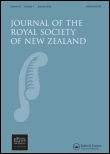
JOURNAL OF THE ROYAL SOCIETY OF NEW ZEALAND
Scope & Guideline
Unveiling Innovations in Science and Humanities
Introduction
Aims and Scopes
- Environmental Science and Climate Change:
The journal extensively covers research related to environmental science, climate change impacts, and adaptation strategies specific to New Zealand's unique ecosystems and geographic challenges. - Indigenous Knowledge and Māori Perspectives:
A significant focus is on incorporating Māori knowledge systems (Mātauranga Māori) into scientific research, emphasizing the importance of indigenous perspectives in various fields such as health, education, and environmental science. - Biodiversity and Conservation:
Research on New Zealand's unique flora and fauna, including studies on fossil records, conservation strategies, and biodiversity assessments, plays a critical role in the journal's publications. - Health and Wellbeing:
The journal also prioritizes research in public health, particularly studies addressing health disparities among different populations in New Zealand, including Māori and Pacific communities. - Technological Innovations and Applications:
There is an emphasis on technological advancements and their applications in various fields, including agriculture, energy, and health, showcasing innovative solutions to contemporary challenges. - Social Sciences and Education:
Research addressing social issues, education, and community development in New Zealand is well-represented, focusing on enhancing societal wellbeing and equity.
Trending and Emerging
- Climate Change Adaptation and Resilience:
Recent publications indicate a strong trend toward exploring climate change adaptation strategies, reflecting the urgent need to address environmental challenges faced by New Zealand's communities and ecosystems. - Interdisciplinary Approaches in Research:
There is a growing emphasis on interdisciplinary research that integrates various scientific fields, including social sciences, technology, and indigenous knowledge, fostering comprehensive solutions to complex issues. - Mental Health and Wellbeing Research:
An increase in studies addressing mental health, particularly among marginalized communities, suggests a significant trend towards understanding and improving mental health outcomes in New Zealand. - Technological Innovation in Health and Agriculture:
Emerging themes related to the use of technology in health diagnostics and agricultural practices showcase a shift towards innovative solutions that leverage modern technology for societal benefits. - Biodiversity and Conservation Efforts:
There is a resurgence of interest in biodiversity and conservation, particularly in the context of New Zealand's unique ecosystems and species, highlighting the importance of these areas in current research.
Declining or Waning
- Traditional Physical Sciences:
There has been a noticeable reduction in publications related to traditional physical sciences, such as basic physics and chemistry, possibly due to a growing emphasis on applied sciences and interdisciplinary research. - Historical Research:
Papers focusing on historical analysis and archival studies have become less frequent, indicating a potential waning interest in historical perspectives compared to contemporary issues and their immediate impacts. - Agricultural Practices and Studies:
Despite the importance of agriculture in New Zealand's economy, research specifically focusing on traditional agricultural practices appears to be declining, as newer themes related to sustainable practices and technologies gain traction.
Similar Journals
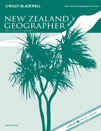
New Zealand Geographer
Exploring the Depths of Geography and Earth SciencesNew Zealand Geographer, published by WILEY, is a distinguished academic journal that has made significant contributions to the fields of geography, planning, and earth sciences since its inception in 1945. With a dedication to advancing knowledge through rigorous research and critical analysis, the journal encompasses a broad spectrum of topics relevant to both regional and global geographies. This journal is currently indexed in Scopus, achieving commendable rankings in multiple categories, including a Q3 status in both Earth and Planetary Sciences and Geography, Planning and Development for 2023, highlighting its relevance and standing within the academic community. Although it does not currently offer open access, its commitment to providing insightful and impactful content ensures that it remains a vital resource for researchers, professionals, and students alike seeking to deepen their understanding of geographical phenomena. The journal's ongoing publication until 2024 continues to foster scholarly discourse, making it an essential platform for innovative research in geographic studies.

CienciaUat
Empowering discovery and dialogue in science and technology.CienciaUat is a distinguished academic journal published by the Universidad Autónoma de Tamaulipas, dedicated to fostering innovative research across various scientific disciplines. With an ISSN of 2007-7521 and an E-ISSN of 2007-7858, this journal serves as a platform for the dissemination of high-quality research findings that contribute to the advancement of science and technology within both local and international contexts. The journal aims to promote scholarly communication among researchers, professionals, and students, emphasizing the importance of empirical evidence and interdisciplinary approaches. Though specific metrics like H-Index and Scopus rankings are currently not provided, CienciaUat is committed to maintaining rigorous peer-review standards. The journal’s open-access model facilitates wide accessibility, ensuring that pivotal research reaches a global audience. The editorial team encourages submissions that adhere to the highest academic standards, reflecting innovation and relevance in today’s scientific landscape.

NEW ZEALAND JOURNAL OF BOTANY
Fostering Innovation in Plant Science ResearchThe New Zealand Journal of Botany, published by the esteemed Taylor & Francis Ltd, serves as a pivotal platform for disseminating significant research in the fields of Ecology, Evolution, Behavior and Systematics, as well as Plant Science. With a rich history dating back to 1963 and an impressive convergence extending to 2024, this journal has established itself as an essential resource for researchers and professionals dedicated to understanding the complexities of plant life and ecological systems in New Zealand and beyond. The journal is currently categorized in the Q3 quartile for both relevant disciplines as of 2023, reflecting its balanced influence within the global academic community. Although not an open access journal, it retains a significant impact factor, evidenced by its Scopus rankings, which place it within the top half of its categories. This makes it an invaluable tool for students, researchers, and academics aiming to engage with robust, peer-reviewed scientific findings and contribute to the evolving discourse surrounding botany and ecological research.
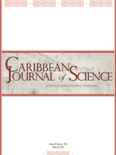
CARIBBEAN JOURNAL OF SCIENCE
Fostering collaboration and knowledge in Caribbean science.Caribbean Journal of Science, published by the University of Puerto Rico, serves as a crucial platform for disseminating innovative research in the field of science across the Caribbean region. With an ISSN of 0008-6452, this journal captures the essence of multidisciplinary studies, ranking 47 out of 111 in its category, showcasing a 58th percentile within Scopus. Although it doesn't currently offer Open Access, it has extended its academic reach since its inception in 1980, fostering collaboration and knowledge growth among researchers, professionals, and students alike. The journal covers an expansive range of scientific disciplines and continues to be a vital resource for those seeking to engage with and contribute to the scientific landscape of the Caribbean. For anyone dedicated to advancing scientific inquiry and practice in this vibrant region, the Caribbean Journal of Science represents an invaluable asset.
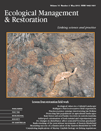
ECOLOGICAL MANAGEMENT & RESTORATION
Transforming research into impactful environmental practices.Ecological Management & Restoration is a premier international journal published by Wiley, dedicated to advancing the fields of ecology, environmental management, conservation, and restoration practices. With an impact factor that positions it in the Q2 category across various ecological and management domains, this journal serves as a critical platform for researchers and professionals seeking to address contemporary issues related to ecosystem health, biodiversity, and sustainable management. Covering a wide range of topics from ecological restoration techniques to policy impacts on nature conservation, the journal caters to a diverse audience and contributes to the scientific community's understanding of environmental challenges. Importantly, the journal provides significant visibility, ranking in the top percentiles within key ecological research arenas such as Nature and Landscape Conservation, reinforcing its value for researchers aiming to influence both scientific thought and practical applications in ecology and management. The journal's commitment to disseminating high-quality research makes it an essential resource for students, researchers, and practitioners dedicated to fostering a sustainable future.
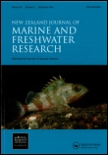
NEW ZEALAND JOURNAL OF MARINE AND FRESHWATER RESEARCH
Innovating Research for Sustainable Water ManagementNEW ZEALAND JOURNAL OF MARINE AND FRESHWATER RESEARCH, published by Taylor & Francis Ltd, stands as a distinguished platform for the dissemination of innovative research in the realms of aquatic science and ecology. With an ISSN of 0028-8330 and E-ISSN 1175-8805, this journal has been curating significant scientific contributions since its inception in 1967, continuing through to 2024. Recognized in the Q2 category across multiple relevant fields—including Aquatic Science, Ecology, and Water Science—this journal ranks notably in Scopus, with a 74th percentile for Ecology, Evolution, Behavior and Systematics, highlighting its impact and relevance within the scientific community. Though not an open-access publication, its rigorous peer-reviewed articles offer insights that resonate with researchers, professionals, and students who are passionate about advancing our understanding of freshwater and marine ecosystems. By fostering a collaborative space for ecological and environmental inquiries, the NEW ZEALAND JOURNAL OF MARINE AND FRESHWATER RESEARCH is essential for those aiming to contribute to the vital conversations around biodiversity, conservation, and sustainable management of aquatic resources.

NEW ZEALAND JOURNAL OF HISTORY
Connecting National Heritage with Global PerspectivesThe New Zealand Journal of History is a preeminent scholarly publication dedicated to the field of historical research, focusing on the rich and diverse history of New Zealand from both national and global perspectives. Published by the University of Auckland, this journal serves as a vital platform for historians, researchers, and students to engage with novel ideas and scholarly discourse. Although it is not an open-access journal, its impact within the academic community is underscored by its consistent ranking within the Scopus database, where it holds the position of rank #681 out of 1328 in the Arts and Humanities category, reflecting a commendable percentile of 48th. Covering essential years of publication from 1978 to 2019, the journal offers a comprehensive archive of articles that explore various historical themes and methodologies. By providing a critical examination of New Zealand's past, the New Zealand Journal of History plays an essential role in inspiring further research and understanding of historical contexts, making it indispensable for historians and students alike.

JOURNAL OF THE NATIONAL SCIENCE FOUNDATION OF SRI LANKA
Connecting Researchers for a Sustainable FutureJOURNAL OF THE NATIONAL SCIENCE FOUNDATION OF SRI LANKA, with ISSN 1391-4588 and E-ISSN 2362-0161, is a respected academic publication disseminated by the National Science Foundation of Sri Lanka. Operating since 1999, this journal encompasses a broad spectrum of multidisciplinary research, currently positioned in the Q3 category and ranking #101 out of 171 in its field, indicating its significant contribution to advancing knowledge across various scientific domains. With an ambition to foster local and international scholarly dialogue, the journal encourages submissions that address fundamental and applied aspects of science pertinent to Sri Lanka and beyond. Though it operates under a conventional access model, the journal is committed to promoting high-quality, peer-reviewed articles that are vital for researchers, professionals, and students aiming to stay at the forefront of scientific advancements in the region.

Facets
Empowering Researchers with a Multidimensional ApproachFacets is a prominent open-access journal published by Canadian Science Publishing, dedicated to the multidimensional exploration of scientific knowledge across various disciplines. With an ISSN of 2371-1671, this journal has established itself as a vital resource for researchers, professionals, and students alike since its transition to open access in 2016. Based in Ottawa, Canada, Facets enjoys a remarkable reputation, evidenced by its ranking in the top quartile (Q1) of multidisciplinary journals as of 2023, and its impressive Scopus ranking as #24 out of 171, positioning it in the 86th percentile. The journal aims to facilitate innovative research and foster collaborations by providing a platform for cutting-edge studies that address complex, interdisciplinary challenges. The focus on a broad scope ensures that diverse perspectives contribute to the ongoing conversation in the scientific community, making Facets an essential point of reference for those seeking to stay at the forefront of scientific research.

Journal of New Zealand Studies
Advancing Interdisciplinary Scholarship on New ZealandJournal of New Zealand Studies, published by Victoria University of Wellington, Faculty of Law, serves as a pivotal platform for exploration and scholarship pertaining to the cultural, social, and historical dimensions of New Zealand. With its ISSN 1176-306X and E-ISSN 2324-3740, this journal emphasizes interdisciplinary research and aims to promote dialogue between various disciplines within the arts and humanities and social sciences. Despite being categorized in the Q4 quartile for both fields, it represents a unique opportunity for researchers and academics to contribute to, and engage with, the evolving narrative of New Zealand’s identity and its global context. This periodical is crucial for those seeking to delve deeper into the local issues, cultural phenomena, and societal changes that shape New Zealand. It welcomes contributions that push the boundaries of conventional research, thereby enhancing scholarly discourse. For researchers, professionals, and students alike, Journal of New Zealand Studies offers a rich resource for advancing knowledge and fostering an appreciation for New Zealand's diverse scholarly landscape.